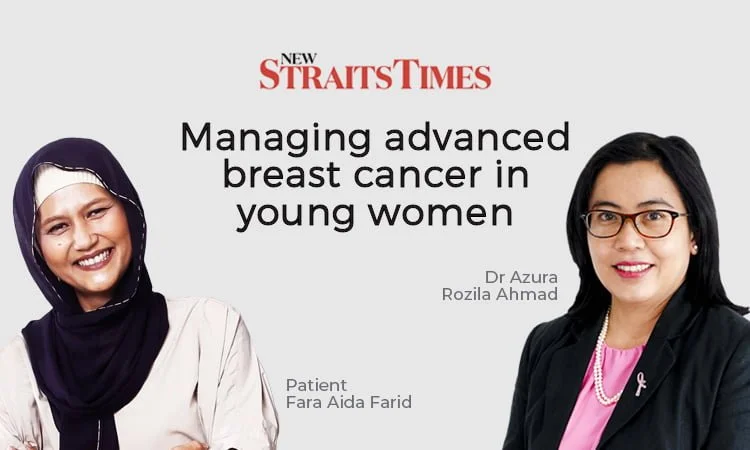Article Summary:
New Straits Times– 13 October 2020
Breast cancer remains the second leading cause of death in women worldwide.
The focus has always been on prevention, survival and cure of this disease. However, metastatic or advanced breast cancer, the most severe stage of the disease, is incurable, which means such patients are often left out of the conversation.
What is especially worrying is the increasing trend of advanced breast cancer among younger women.
Our national statistics on breast cancer indicate that a sharp increase can be seen from the age of 30 onwards, rising steeply, before finally reaching a peak after menopause, which is around the mid-50s.
“While the diagnosis and treatment of breast cancer is difficult for women of any age, younger patients may find it more overwhelming as they face additional anxiety and stress due to a life-threatening disease occurring in the middle of their personal, professional and reproductive lives.”
Dr Azura adds that breast cancer is a serious disease, and any delay in diagnosis poses a real risk of tumour progressing from being curable (with near-normal life expectancy) to non-curable (with very reduced life expectancy). It is still common to diagnose breast cancer at an advanced stage in Malaysia.
CHOOSING TREATMENT OPTIONS
The makeup of your tumour will help your doctor define your cancer and guide decisions about which treatments are the best. Treatment decision is largely dependent on the cancer subtype, explains Dr Azura, particularly hormone receptor and HER-2 (human epidermal receptor-2) status.
However, cancer research is a rapidly-changing field with expanding treatment options, particularly in areas of targeted drug therapy and immunotherapy. There are options for kinder and gentler but more effective treatments which are transforming how we treat breast cancer, she adds.
Given the unique psycho-social issues younger women face, they must be guided and supported in a sensitive manner during treatment.
The oncologist will be able to guide them in choosing the appropriate treatment plan while factoring in issues such as side effects management with a focus on quality of life, coping strategies (personal or professional) and linking them to support groups for additional psycho-social support if needed.
A PATIENT’S STORY
Breast cancer patient Fara Aida Farid was diagnosed with the disease 10 years ago, but instead of conventional medicine, she opted for herbal remedies.
“I couldn’t accept my doctor’s recommendation to go through chemotherapy. I heard many horror stories about it, and I was influenced by these stories,” she says.
By 2014, her cancer had spread. But her oncologist assured her that there was hope to slow down the disease.
“She introduced me to another patient who had done chemotherapy. Her bravery in going through those extraordinary experiences as a cancer patient gave me the courage to walk through my own fears. I finally accepted that I needed to trust this process,”
For full article, source: New Straits Times











